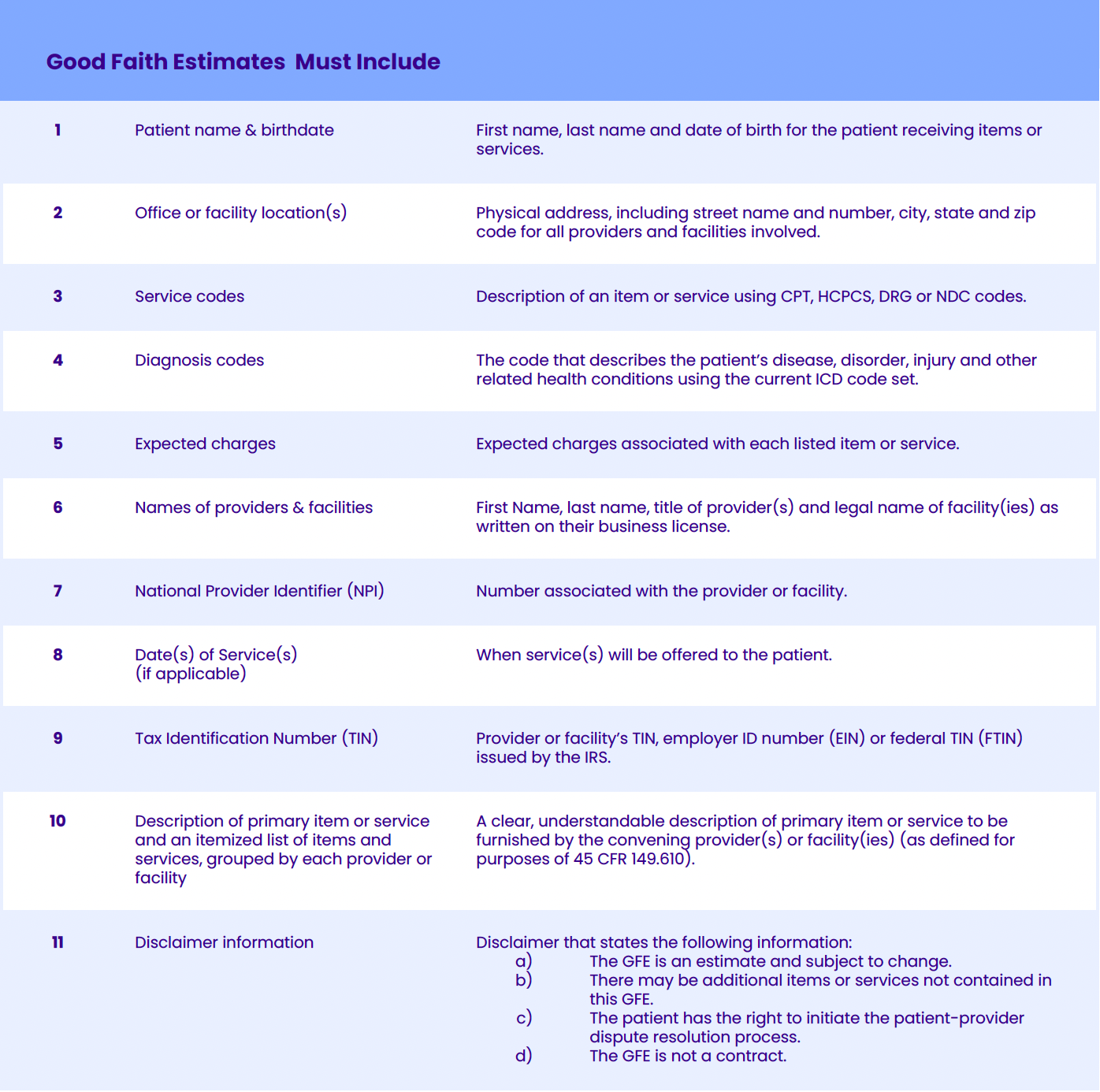This blog post is composed of definitions and explanations of the No Surprises Act, Good Faith Estimate and Convening Provider/Facility.
As of Jan. 1, 2022, the No Surprises Act (NSA) went into effect, which is a multilayered law about preventing surprise medical bills and providing price transparency.
There are two distinct parts to the NSA: The first addresses surprise bills for patients with individual or group health plans and the second adresses Good Faith Estimates for patients wishing to bypass their health plans (self-pay patients) and patients without health coverage (uninsured patients).
Those covered by group and individual health plans are now protected (under the NSA) from receiving surprise medical bills when they receive emergency services from out-of-network providers, non-emergency services from out-of-network providers at in-network facilities and services from out-of-network air ambulance providers.
The NSA does NOT apply to health insurance coverage programs that already have protections against surprise medical billing including Medicare, Medicaid, Indian Health Services, Veterans Affairs Health Care or TRICARE.
Under the NSA, all providers (doctors, hospitals, ASCs, MRI places, everyone) MUST provide a Good Faith Estimate (GFE) of the expected charges to any self-pay or uninsured patient no later than 3 business days after the service is scheduled (if scheduled at least 10 days in advance). If the service is scheduled less than 10 days in advance, the GFE must be given to the patient no later than 1 business day. Providers must also provide a GFE to a self-pay or uninsured individual upon request, no scheduling required.
The Centers for Medicare and Medicaid Services (CMS) have provided a GFE template of the required information. Here’s a list of the required information and descriptions of what’s needed on the GFE.

Along with the information found above, providers must determine who is responsible for furnishing the GFE to the individual that is inclusive of all the items or services to be provided by co-providers and co-facilities involved in the scheduled items or services. The provider or facility providing the comprehensive estimate is also called the convening provider or convening facility.
For example:
A patient schedules a knee surgery at a hospital. The hospital coordinates with the surgeon, anesthesiologist and other health care professionals to assist in the knee surgery (i.e., the primary item or service) to create an estimate with expected charges for all involved. The hospital is the convening facility and the surgeon, anesthesiologist and other health care professionals are co-providers.
In this example, the patient may need multiple physical therapy appointments following the surgery. Since physical therapy needs to be scheduled separately from the primary item or service, the hospital should list it on the GFE that they create, but the diagnosis codes, service codes and expected charges do not need to be part of this estimate.
Above the separately scheduled items/services, the convening provider/facility should insert a disclaimer like this.
Separate Good Faith Estimates will be issued by designated provider(s) or facility(ies) for the following items and/or services upon scheduling or request.*
The Department of Health and Human Services would like convening providers/facilities to offer comprehensive estimates with all information offered for co-providers and co-facilities, even for separately scheduled items and/or services, but acknowledges that communication between facilities and providers isn’t what it should be to completely support the convening provider/facility GFE. For this reason, no penalties are currently in place for noncompliance until Jan. 1, 2023.
*This disclaimer is an example of the possibilities a convening provider may say and in no way legal advice.
For more information, see CMS.gov.
Shameless Plug: Rivet's tools help your practice succeed.Rivet offers software solutions that integrate with your EHR for up-front patient cost estimates (that comply with the 2021 No Surprises Act), as well as denied and underpaid claim solutions.
To see a quick one-page synopsis of how our estimates comply with the Good Faith Estimate, click the button below for a free PDF.
To see Rivet's Estimates and discuss billing pain points, request a demo below.

